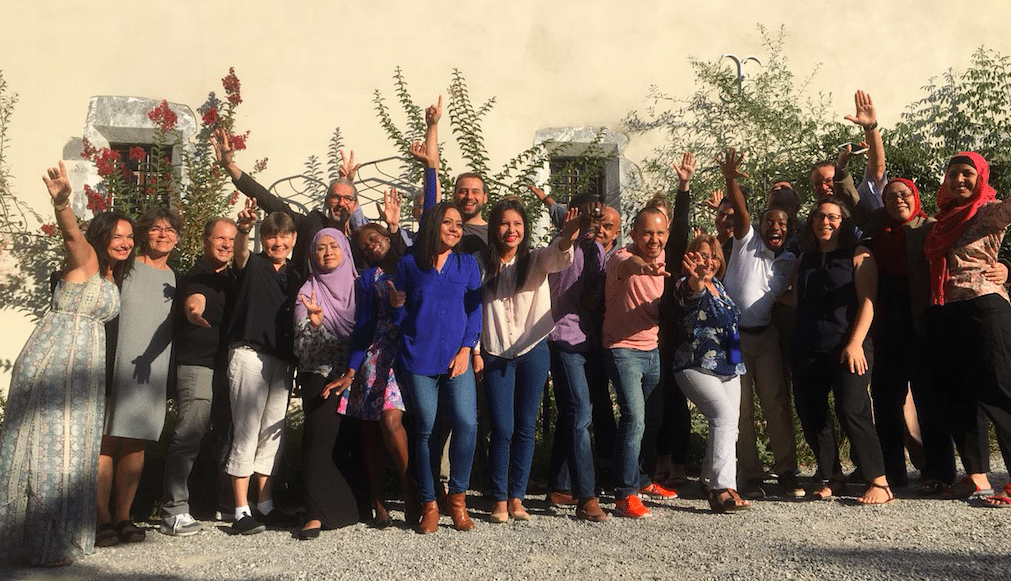Youth Economic Participation Initiative convenes in Talloires, France
Monday, October, 3rd, 2016 News
by Brianda Hernandez
“YEPI is not about extending the current pedagogies about youth entrepreneurship, it’s about shaking it, reorganizing it, disrupting it alongside the youth” – Ross VeLure Roholt, University of Minnesota, YEPI Learning Partner Team
Representatives from the Youth Economic Participation Initiative (YEPI) programs traveled from around the world for a week-long gathering at the Tufts European Center, birthplace of the Talloires Network. YEPI responds to the gap between the realities of the job market in many developing countries and the ability of university-educated youth to successfully participate in the economy.

Though different, each of the sites employs youth entrepreneurship methodologies that are transforming student teaching, and looking at the global issues plaguing communities. The programs ask questions such as: if traditional pedagogies no longer sufficiently prepare students for the economy, what can be created to do so? How can this group of professors, facilitators, community leaders, and youth disrupt the entrepreneurial culture to create a pipeline for underrepresented youth to become leaders in the economy? What can a cohort in eight Talloires Network member universities in the Global South create to share innovative best practices of youth entrepreneurship that can be applied in a global context?
The hopeful professors, passionate facilitators, resilient community organizers that travelled from each of the sites come from diverse academic backgrounds :the social and natural sciences, engineering and business. They are in the front lines of pedagogical change – or “disruptive pedagogy” – who carry out work in challenging environments The champions of these projects instill in participant youth that anyone has the power to break the stereotypes society imposes on them, that they have the power to empower the communities they come from, and that failure is instructive and necessary for any young entrepreneur.
Over the course of the week, participants had the opportunity to show the group how they trained their youth. The Social Innovation Lab (SIL) director, Maryam Mohiuddin, gave an evocative session on “Moral Imagination” by showing a film called Samsara, which depicts the nature of human beings, what they are capable of destroying and exploiting as well as creating and saving. The goal of the session was to instill in young entrepreneurs a sense of purpose and a moral responsibility to create an enterprise that takes into account social and environmental costs. As expected from a group of people who work with youth, their reaction was emotional, but the session also reminded them of their responsibility as champions of youth entrepreneurship. “To remind youth to understand what their motivation for starting an enterprise is. If they’re motivated by love, they’re more likely to make choices that don’t exploit [people and the Earth],” said Carol Williams of the Raymond Ackerman Academy in South Africa’s University of Cape Town.
Other sites that facilitated sessions were Technopole at 2iE (International Institute for Water and Environmental Engineering), Emprende UV at Universidad Veracruzana, Raymond Ackerman Academy at University of Cape Town, Panhari at University of Zimbabwe, CESMED at National University of Malaysia (UKM), and the Center for Entrepreneurial Learning at University Austral de Chile. The sessions ranged from group exercises discussing the process of starting an incubator, to developing an elevator pitch for a client. Across each of the culturally diverse sites and pedagogies in play there was a resounding theme: personal development is equally important to business development. Young entrepreneurs are more likely to succeed if they feel empowered and confident in their abilities.
The partners also had the chance to work together on the report that will be delivered to the MasterCard Foundation. This activity was the first time the partners had the opportunity to compare the qualitative and quantitative data they had collected since the beginning of the grant and to directly edit the report. Working together in one physical place gave them a sense of camaraderie.
The convening provided these champions of youth entrepreneurship a sense of community and encouragement knowing there are others thousands of miles away also disrupting the youth entrepreneurship pedagogy.